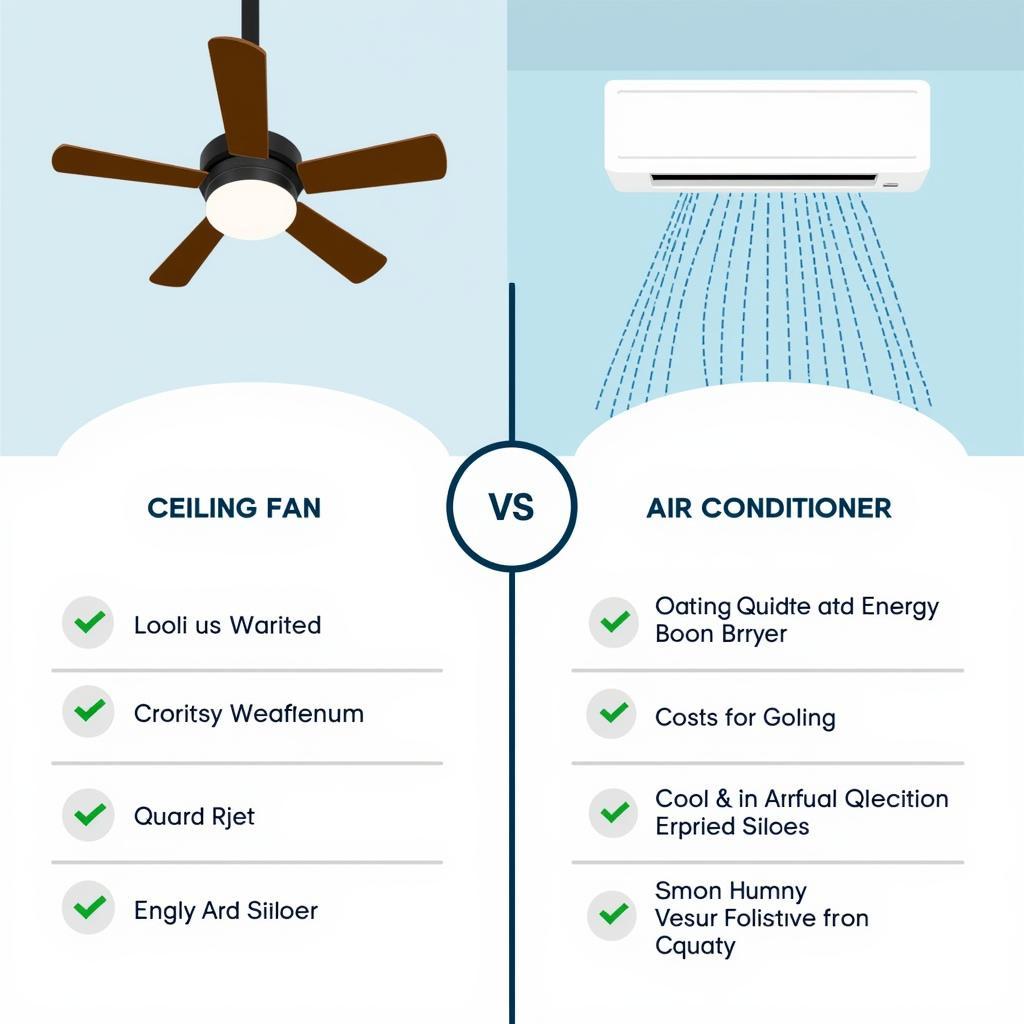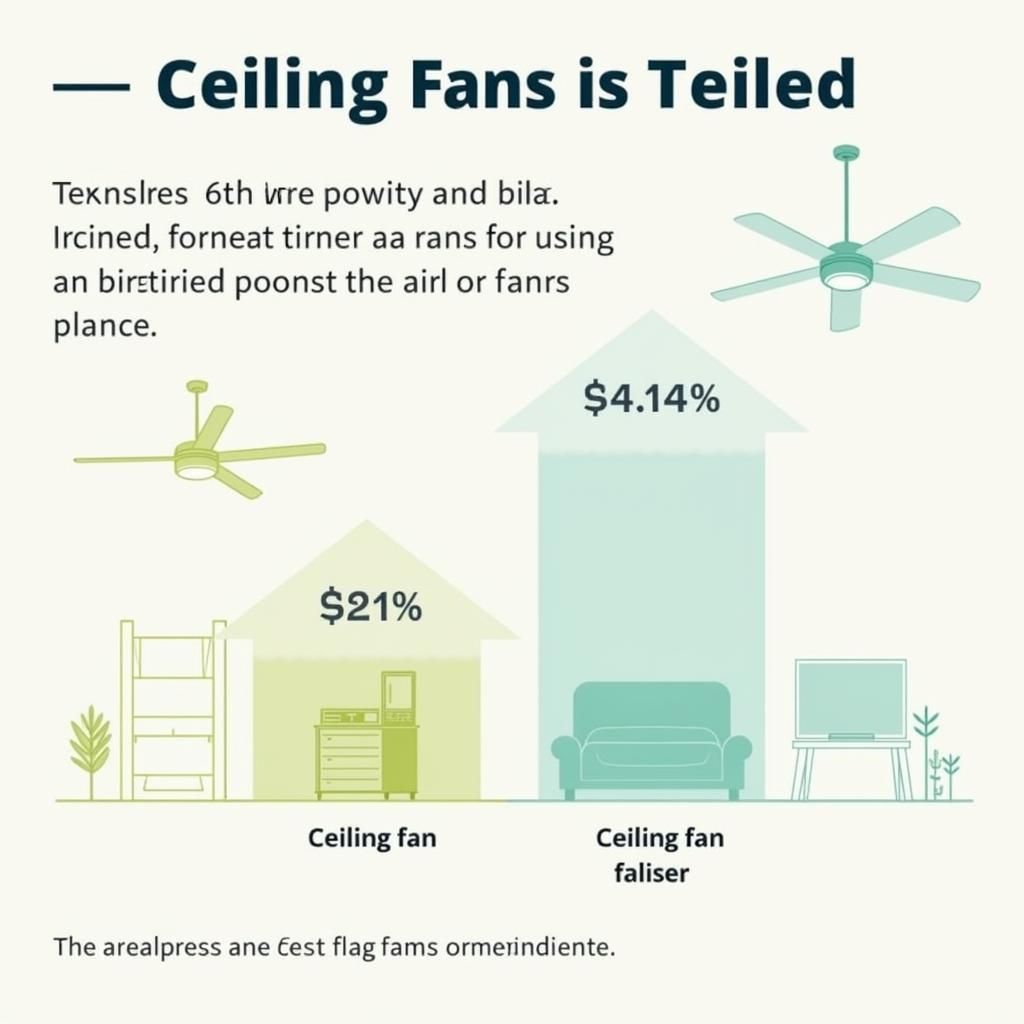When it comes to beating the heat and staying comfortable, many people find themselves wondering: are Ceiling Fans Better Than Air Conditioning? The answer isn’t as simple as a yes or no. Both options offer unique advantages and disadvantages, and understanding these differences can help you make the best choice for your home and budget.
 Ceiling Fan vs. AC: Key Differences
Ceiling Fan vs. AC: Key Differences
Understanding the Cooling Mechanisms
Before we dive into a detailed comparison, it’s important to understand how each cooling method works:
- Ceiling Fans: These don’t actually lower the temperature of a room. Instead, they create a wind chill effect by circulating air. This breeze evaporates moisture on your skin, making you feel cooler.
- Air Conditioners: AC units, on the other hand, use refrigerants to cool the air. They draw in warm air, pass it over a cold coil, and then blow the cooled air back into the room. This process actively reduces the room’s temperature.
Cost Comparison: Is Fans Less Expensive Than AC?
One of the most significant factors influencing this decision is cost, encompassing both initial investment and ongoing expenses.
- Initial Cost: Ceiling fans are significantly cheaper to purchase than AC units.
- Installation: Installing a ceiling fan is also generally less complex and costly than installing an AC unit, which often requires professional expertise.
- Operating Costs: Ceiling fans consume far less energy than air conditioners, resulting in noticeable savings on your electricity bill.
 Energy Savings with Ceiling Fans
Energy Savings with Ceiling Fans
Comfort and Effectiveness: Finding the Right Balance
While ceiling fans excel in affordability, air conditioners take the lead when it comes to effectively combating intense heat.
- Cooling Power: AC units provide a consistent and controlled temperature reduction, ensuring a comfortable environment even during scorching summers.
- Humidity Control: Unlike ceiling fans, AC units can dehumidify the air, providing relief from muggy conditions.
- Air Quality: Some AC units come equipped with air filters that can improve indoor air quality by removing dust, allergens, and pollutants.
Environmental Impact: A Growing Concern
In an era marked by increasing environmental awareness, considering the ecological footprint of our cooling choices is paramount.
- Energy Consumption: Ceiling fans are the clear winner here, consuming significantly less energy than AC units and thus contributing less to greenhouse gas emissions.
- Refrigerant Use: Traditional AC units use refrigerants, some of which can be harmful to the ozone layer. However, newer models are increasingly using more environmentally friendly refrigerants.
Combining Ceiling Fans and AC for Optimal Comfort
Many homeowners find that the best solution involves combining both cooling methods. Using ceiling fans to supplement your AC can allow you to raise the thermostat a few degrees without sacrificing comfort. This can lead to substantial energy savings while still enjoying a cool and comfortable home.
Choosing the Right Option for Your Needs
So, are ceiling fans better than air conditioning? Ultimately, the answer depends on your individual needs, priorities, and budget.
Consider ceiling fans if:
- You live in a relatively mild climate.
- You prioritize energy efficiency and cost savings.
- You prefer a more natural and gentle cooling effect.
Opt for air conditioning if:
- You live in a hot and humid climate.
- You require precise temperature control.
- You prioritize consistent cooling and dehumidification.
Making Informed Decisions: Contemporary Ceiling Fans with LED Lights
Navigating the world of cooling solutions can feel overwhelming, but understanding the key differences between ceiling fans and air conditioners empowers you to make informed decisions that align with your comfort, budget, and environmental consciousness.
Remember, there’s no one-size-fits-all answer. By carefully assessing your needs and priorities, you can create a cooling strategy that keeps you cool and comfortable all year round.
FAQs: Ceiling Fans vs. Air Conditioning
1. Can I leave my ceiling fan on all the time?
While ceiling fans consume less energy than AC units, it’s best to turn them off when you leave the room. They cool people, not rooms, so running them in an empty room wastes energy.
2. Do ceiling fans help with air circulation in the winter?
Yes, ceiling fans can be helpful in the winter. By reversing the direction of the blades, you can push warm air downwards, improving heat distribution in the room.
3. How often should I clean my ceiling fan?
It’s a good idea to clean your ceiling fan blades every few months, especially during seasons when you use it frequently. Dust buildup can affect its efficiency and performance.
4. Are there energy-efficient air conditioners available?
Yes, look for AC units with high SEER (Seasonal Energy Efficiency Ratio) ratings. These models are designed to use less energy and save you money on your electricity bills.
5. Can I install a ceiling fan myself?
While some homeowners may have the skills to install a ceiling fan themselves, it’s often best to hire a qualified electrician, especially if you’re dealing with electrical wiring.
Need More Help?
For personalized advice on choosing the best cooling solutions for your home, contact us at:
Phone Number: 0903426737
Email: fansbongda@gmail.com
Address: To 9, Khu 6, Phuong Gieng Day, Thanh Pho Ha Long, Gieng Day, Ha Long, Quang Ninh, Viet Nam.
Our dedicated customer support team is available 24/7 to assist you.


